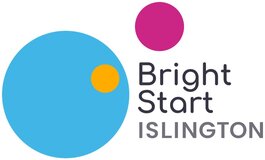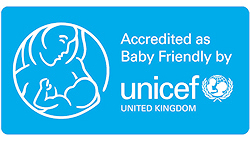If you’re pregnant or trying for a baby, are a mum with a baby under 1 year and/or have children under 4 years, you can get free multivitamins from children’s centres. If you are receiving income support or are under 18 and pregnant, you may also be able to receive a Healthy Start prepaid card for financial help with buying healthy food and milk. For more information, see www.islington.gov.uk/healthystart or ask at your local Children’s Centre
Infant feeding and relationship building (Islington)

Infant Feeding in Islington
Welcome to the Bright Start Infant Feeding services.
We hope this webpage will offer an insight into services and resources to support families during there infant feeding journey. Please explore and if we can be of any further support our contact information can be found below.
Bright Start Islington is passionate about Infant Feeding. All practitioners within Bright start are Infant feeding trained in accordance with the Unicef Baby Friendly Initiative. In 2019 the Bright Start Health Visiting services received re-accreditation and Bright Start Children’s Centres achieved accreditation. We are extremely proud to work with families during their infant feeding journey and have an array of services which are available to advise and empower families.
We aim to provide encouragement, support and up-to-date information for all Islington parents. We work to empower mothers to breastfeed their babies confidently and successfully. For those who choose to bottle feed their babies, we aim to provide information to enable safe bottle feeding and build responsive feeding. As the infant feeding journey continues, Islington have a range of services to support with introducing solids and some of the other infant feeding milestones.
Topics
Help Me Grow My Brain – Relationship building
In pregnancy and the early years of life your baby’s brain is growing very quickly and there are many things you can do to help them to grow and make them feel safe and secure
Responsive Breastfeeding
Responsive breastfeeding is about responding to your baby’s cues and not following a schedule or routine. Responsive breastfeeding recognises that feeds are not just for nutrition, but also provide comfort and reassurance for both mother and baby. For Islington services click here.
Breastfeeding support
Throughout your breastfeeding journey there may be times where you need support and guidance. In Islington we have a number of services to help that are free for all parents.
For Islington services click here. Some further helpful resources can be found below.
Feeding out and about in Islington
Feeding when you are outside of your home can feel worrying for many parents. Islington is a 'breastfeeding welcome' borough and supports mothers and their babies to feed when and where they feel comfortable. For more information about feeding when you are out and about in Islington, we have some helpful resources below:
Responsive Bottle Feeding
Responsive bottle feeding is about supporting you to tune in to your baby’s feeding cues by holding them close during their feeds, offering the bottle in response to feeding cues and pacing the feeds. For more information contact your Health Visitor.
You may find the following information may useful too:
Starting Solid Food
At around 6 months, babies develop the skills they need for managing solid foods. Click here for more information.
Start4Life have also produced a handy bite-sized guide which can be downloaded here.
Safer Sleep
There are lots of ways to help your baby to settle and our sleep patterns and needs change throughout our lifetime. Click here for more detail from the Lullaby Trust.
More information on caring for your baby at night can be found in the leaflet below
Other useful links
Additional useful, reliable and evidence-based evidence can be found here.
Emotional wellbeing during pregnancy and early parenthood
Pregnancy and the early months of parenthood can be a time of great excitement and happiness but can also bring some challenges to emotional and mental wellbeing as parents are adjusting to all the changes that a new baby brings.
Bright Start health visiting service together with colleagues from midwifery and the specialist mental health services aim to support your emotional as well as your physical wellbeing during this time and have a variety of services in place to provide you with the help you need when you need it.
My Pregnancy and post-birth Wellbeing Plan
Content to follow
What do health visitors do?
Health visitors are qualified nurses or midwives who also undertake a specialist degree in public health. Many have additional qualifications, knowledge and skills in evidence-based interventions such as motivational interviewing and counselling.
Your health visiting team will contact you antenatally and come and visit you at home when your new baby is between 10 and 14 days old. They will then see you again when your baby is between 6 and 8 weeks old. You can contact your health visiting team in between these times whenever you need support or advice about your baby or yourself. You can do this by phone, email or by attending one of our clinics. One of the key areas that health visitors will talk to you about is your emotional health and wellbeing.
How Bright Start Health Visitors can support your emotional wellbeing
More than 1 in 10 women experience some degree of mental health problems during pregnancy and the first year of their baby’s life. These may include post-natal depression and anxiety and can occur at different levels - most people experience mild symptoms lime the ‘baby blues’ but some may have more serious forms of mental illness. We know that these can and do get better but early identification of problems and early intervention with the appropriate level of help is incredibly important for helping parents to recover.
Whenever you meet with your health visitor they will ask about your mental health and may use these questions.
During the past month, have you often been bothered by feeling down, depressed or hopeless?
During the past month, have you often been bothered by little interest or pleasure in doing things?
This is not to be nosey or intrusive by to try to ensure that if you are struggling with you mental health, then this is picked up quickly. If you answer yes to either of these questions, the health visitor may go onto ask you some further questions to help clarify how you are feeling. The health visitor can’t diagnose of a mental health condition but may ask you to speak to your GP who is able to do that.
We will also offer you our ‘Pregnancy and Post-birth Wellbeing Plan’ which helps you to think about how to get help with your mental health, should you feel you need it.
If you do feel that you or your partner need some extra help with your mental health, please contact your health visiting team who will help to signpost you to the best support for you. If you don’t know who your health visiting team is you can find out by calling 0202 3316 8008 and we will put you in touch with them. This is based on your postcode.
What are Emotional Support Visits or Listening Visits?
If your health visitor has offered you Emotional Support Visits (sometimes called Listening Visits) you may wonder what these are!
Health Visitors are trained in additional counselling techniques which allow them to offer you 4-6 visits to focus on how you are feeling, to listen to what you are going through and to think with you about ways in which you might be able to get through some of the challenges that you are facing. Whilst health visitors are not qualified counsellors, there is research which shows that this kind of support is often very helpful for new parents. Emotional Support Visits (ESVs) are particularly helpful in several ways.
- If your mental health problems are relatively mild, ESVs alone may be enough to help you to come through a challenging time and to feel better.
- Where you and your health visitor agree that you need additional support, the ESV can form part of an assessment which will help to clarify your issues and allow you to be referred to the most appropriate service.
- Sometimes specialist mental health services have a long waiting time and a series of ESVs can be a valuable support whilst you are waiting for other treatment to begin so that you are not left facing this difficult time alone.
If you are interested in finding out more about how Emotional Support Visits may help you, please contact your health visiting team. If you don’t know who your health visiting team are you can find out by calling 020 3316 8008 and we will put you in touch. This is based on your postcode.
What other mental health support is available to me?
The health visiting teams work with a number of different services in Islington to ensure you get the mental health support that you need. These include:
Bright Start Children’s Centres: Bright Start offers a wealth of services to families in Islington. If you are experiencing mental health problems you are still very welcome to access these although we understand that this may be difficult if you are feeling unwell. Our staff have training in supporting clients’ emotional wellbeing and you will be warmly welcomed
iCope: offers a range of specialist psychological interventions to adults in Islington. You can refer yourself or ask your health visitor to help you do this. You will be contacted by a member of the iCope team who will advise you on the right treatment option for you. There may then be a few weeks wait before you start treatment. Please look at the iCope website which tells you more about the service and has loads of helpful resources https://www.icope.nhs.uk/camden-islington
Parent Baby Psychology Service: are a team of clinical psychologists who specialise in supporting parents and babies to develop and strong and healthy relationship. You may be referred to them if part of your mental health issue means you are finding it difficult to bond with your baby.
Specialist Perinatal Mental Health team: this team provides support for women who need specialist mental health care for more complex mental illnesses. The team is made up of doctors, nurses, psychologists and other professionals who work together to help women who need longer term support for their mental health. They can advise on medication, provide therapeutic interventions and offer ongoing support to women and their families during pregnancy and for up to a year after the birth
Women’s Health Psychology teams: both the Whittington and UCLH have these teams which offer women support with psychological issues which are related to their pregnancy or would like support following a difficult birth. You can self-refer to this service. Please ask your health visitor or midwife for a referral form
How to contact us
Islington Breastfeeding Support Service
Tel: 020 3316 8439
Islington Infant Feeding Team
Tel: 0203 316 8441
National Breastfeeding Helpline
Tel: 0300 100 0212 (9:30am – 9:30pm 7 days a week)
Last updated20 Mar 2025


